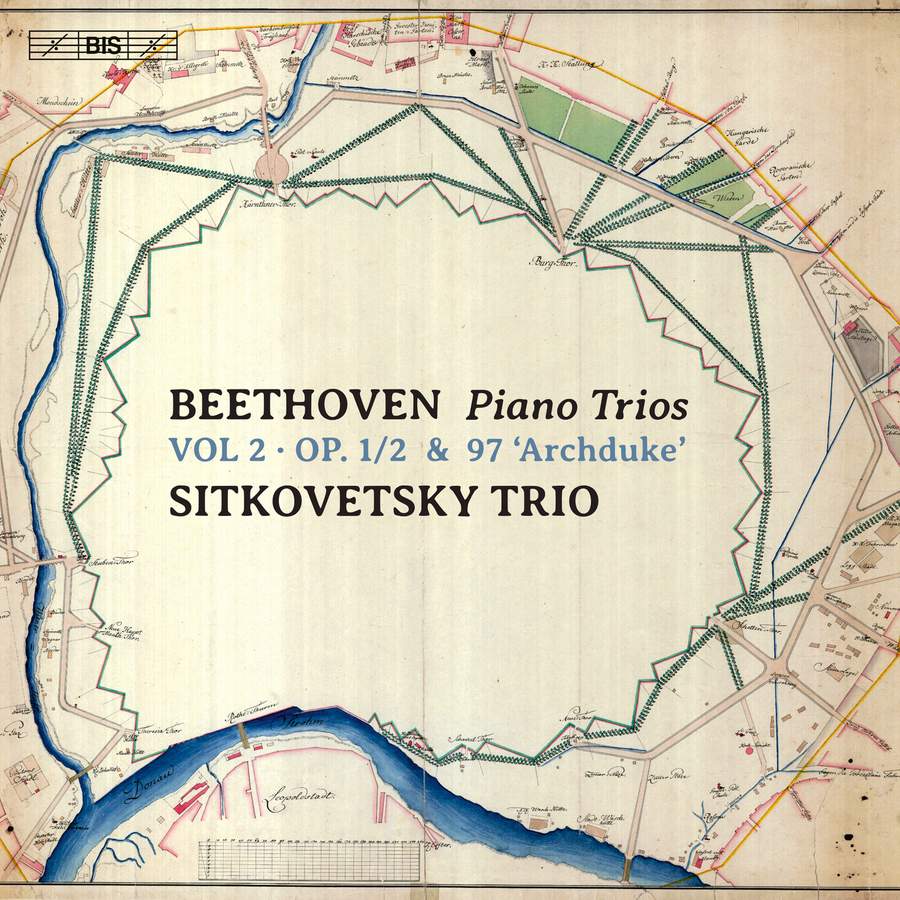BEETHOVEN Piano Trios Vol 2 (Sitkovetsky Piano Trio)
View record and artist detailsRecord and Artist Details
Genre:
Chamber
Label: BIS
Magazine Review Date: 11/2023
Media Format: CD or Download
Media Runtime: 80
Mastering:
DDD
Catalogue Number: BIS2539

Tracks:
| Composition | Artist Credit |
|---|---|
| Piano Trios, Movement: No. 2 in G, Op. 1/2 |
Ludwig van Beethoven, Composer
Sitkovetsky Piano Trio |
| Piano Trios, Movement: No. 7 in B flat, Op. 97, 'Archduke' |
Ludwig van Beethoven, Composer
Sitkovetsky Piano Trio |
Author: Richard Wigmore
Beethoven’s three Op 1 Trios – surely the greatest opus 1 in musical history – are the work of a young man with the bit between his teeth and a point to prove. Nos 1 and 2 still have one foot in the 18th-century salon. But all three are works on a symphonic scale, more ambitious in reach than any trios that had gone before. The Sitkovetskys set the bar high in Vol 1 of their BIS Beethoven cycle (6/20). This follow-up, pairing the second of the Op 1 set, in G major, with the Olympian Archduke, is every bit as enjoyable. In the G major’s spacious Adagio introduction the strings dialogue soulfully against pianist Wu Qian’s improvisatory freedom, while the Allegro, truly vivace, has a tingling eagerness, animated throughout by Qian’s nimble, limpid pianism. Where violin and cello emerge as equals, as in the central development, the players palpably delight in their three-way sallies. Crucial, too, are the trio’s fine gradations of soft playing (including a whispering pp in the coda) and their close observance of Beethoven’s dolce markings. Abetted by superb BIS sound, the hard-to-achieve balance between piano and strings seems spot on.
Other performances, including the Florestan (Hyperion, 4/04) and the Vienna Piano Trio (Nimbus, 3/01), take a more exuberant view of the Scherzo, darting impishly where the Sitkovetsky glide graciously – a valid enough alternative take. The Florestan, especially, also generate more sheer fun in the high jinks of the finale. The Sitkovetsky play the Largo second movement con amore – and why not in this music of soulful, proto-Romantic sentiment. Beethoven here eloquently exploits the cantabile powers of both the violin and cello; and the rapt tenderness of the group’s dialoguing is as memorable as their hushed mystery at the movement’s centre (from 3'15"). At an easily flowing two-in-a-bar, the Florestan present a lighter, more Classically chaste view of the Largo. There’s room for both approaches.
From their serenely floated opening, the Sitkovetsky remind us that the Archduke is, with its numerical predecessor, the Violin Sonata Op 96, the quietest and most tender of Beethoven’s chamber masterpieces. Combining a strong forward momentum with a subtle fluidity, the players muster ample grandeur where required. But moments that linger in the memory include the intimate violin-cello colloquy in the development (from 8'08"), and the sense of hushed expectation just before the recapitulation steals in (10'15"). Amid the bubbling, quirky humour of the Scherzo and finale the Sitkovetsky make you unusually aware of Beethoven’s requests for dolce and espressivo. The finale, taken at a comfortable tempo (as much moderato as allegro), sings as well as struts; and there’s a delightful moment (2'57") where the piano morphs into a folk cimbalom, an effect Wu Qian catches vividly.
Contemporary reports suggest that in slow, sustained music Beethoven made the fortepiano sound like an organ. Wu Qian’s playing of the sublime theme of the Archduke’s Andante – semplice, as the composer requests – makes the point. As ever, Qian is a selfless accompanist when the strings take the limelight, as they do with such eloquence in the coda’s love duet (11'25"). Like almost every other group, the Sitkovetsky choose, and vindicate, an expansive tempo for this movement, closer to Adagio than Beethoven’s prescribed Andante cantabile ma però con moto. My own preference is for the more mobile reading from the Florestan (Hyperion, 11/03), who bring out the music’s dance associations and find a playfulness in the second and third variations that eludes slower performances. But this is largely personal taste. Few could fail to be moved by the Sitkovetsky Trio’s tenderness and concentrated intensity, here and elsewhere. For poetry, colouristic imagination and, not least, an infectious sense of shared enjoyment, these performances can hold their own against any rivals. Roll on Vol 3.
Discover the world's largest classical music catalogue with Presto Music.

Gramophone Digital Club
- Digital Edition
- Digital Archive
- Reviews Database
- Full website access
From £8.75 / month
Subscribe
Gramophone Full Club
- Print Edition
- Digital Edition
- Digital Archive
- Reviews Database
- Full website access
From £11.00 / month
Subscribe
If you are a library, university or other organisation that would be interested in an institutional subscription to Gramophone please click here for further information.




